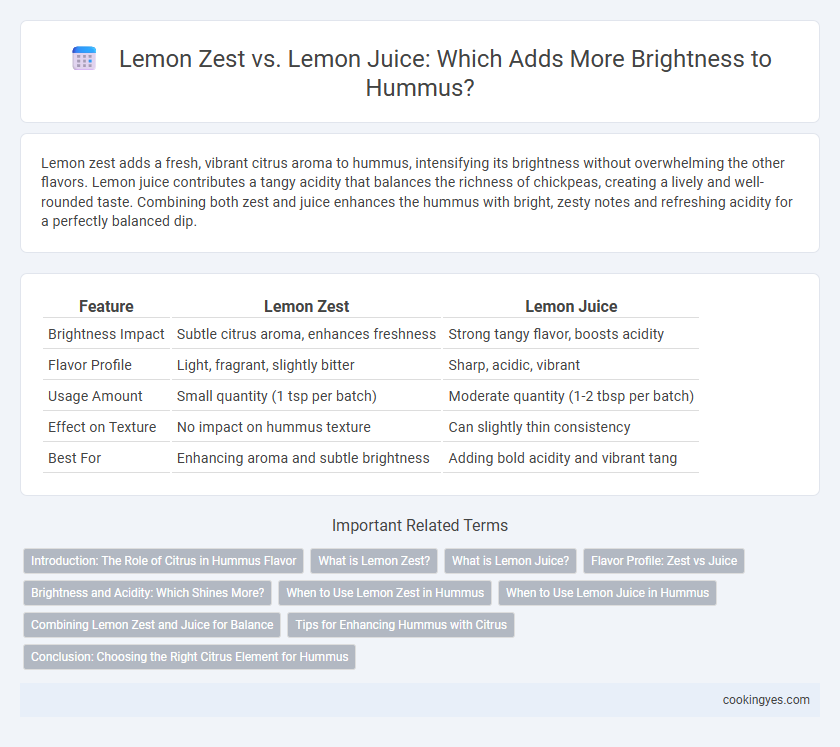Lemon zest adds a fresh, vibrant citrus aroma to hummus, intensifying its brightness without overwhelming the other flavors. Lemon juice contributes a tangy acidity that balances the richness of chickpeas, creating a lively and well-rounded taste. Combining both zest and juice enhances the hummus with bright, zesty notes and refreshing acidity for a perfectly balanced dip.
Table of Comparison
| Feature | Lemon Zest | Lemon Juice |
|---|---|---|
| Brightness Impact | Subtle citrus aroma, enhances freshness | Strong tangy flavor, boosts acidity |
| Flavor Profile | Light, fragrant, slightly bitter | Sharp, acidic, vibrant |
| Usage Amount | Small quantity (1 tsp per batch) | Moderate quantity (1-2 tbsp per batch) |
| Effect on Texture | No impact on hummus texture | Can slightly thin consistency |
| Best For | Enhancing aroma and subtle brightness | Adding bold acidity and vibrant tang |
Introduction: The Role of Citrus in Hummus Flavor
Lemon zest enhances hummus brightness by delivering concentrated citrus oils, intensifying aroma without altering texture. Lemon juice contributes acidity and moisture, balancing richness and adding tangy sharpness to the flavor profile. Combining both ingredients optimizes the citrus impact, elevating hummus complexity and freshness.
What is Lemon Zest?
Lemon zest is the outermost yellow layer of the lemon peel, rich in essential oils that deliver intense citrus aroma and flavor without the acidity of lemon juice. It enhances hummus brightness by adding a fresh and vibrant citrus note, intensifying the overall taste profile while maintaining smooth texture. Using lemon zest in hummus provides a more subtle and fragrant brightness compared to the sharper tang of lemon juice.
What is Lemon Juice?
Lemon juice is the liquid extracted from fresh lemons, rich in citric acid and vitamin C, which provides a sharp, tangy flavor essential for enhancing hummus brightness. Its acidity balances the creaminess of chickpeas and tahini, creating a harmonious, zesty taste profile. Unlike lemon zest, lemon juice penetrates the hummus, delivering a consistent citrus tang throughout the dish.
Flavor Profile: Zest vs Juice
Lemon zest delivers a concentrated burst of citrus oils adding a vibrant aroma and subtle bitterness that enhances the hummus's complexity without overwhelming its creamy base. Lemon juice introduces a sharp, tangy acidity that brightens the overall flavor and balances the richness of chickpeas and tahini. Combining zest and juice creates a layered citrus profile, intensifying brightness while maintaining harmony between zest's aromatic intensity and juice's refreshing tartness.
Brightness and Acidity: Which Shines More?
Lemon zest offers a vibrant citrus aroma and intense brightness without adding extra acidity, enhancing hummus with fresh, zesty notes. Lemon juice contributes significant acidity, brightening the flavor profile but can sometimes overpower the delicate balance in hummus. For optimal brightness, combining lemon zest's aromatic lift with the tangy sharpness of lemon juice creates a harmonious and lively hummus experience.
When to Use Lemon Zest in Hummus
Lemon zest enhances hummus brightness by adding a concentrated, aromatic citrus flavor without extra acidity, making it ideal when you want a subtle, fresh lemon note. Use lemon zest in hummus recipes that emphasize herbal and earthy spices, such as cumin or garlic, to complement their depth without altering the texture. Lemon juice, by contrast, provides sharp acidity that brightens overall flavor but can overpower delicate ingredients if used excessively.
When to Use Lemon Juice in Hummus
Lemon juice is essential for adding vibrant acidity and enhancing the creamy texture of hummus, especially during the blending process where its liquid form integrates smoothly with chickpeas and tahini. Using lemon juice early in preparation helps balance the richness and bring forward the flavors of garlic and cumin, creating a bright and harmonious dip. For consistent brightness and a well-rounded tang, fresh lemon juice is preferred over lemon zest, which works better as a finishing touch for subtle aromatic notes.
Combining Lemon Zest and Juice for Balance
Lemon zest delivers concentrated oils that enhance hummus brightness with a fragrant, intense citrus flavor, while lemon juice adds sharp acidity and brightness for a tangy finish. Combining lemon zest and juice in hummus creates a balanced flavor profile, blending aromatic citrus notes with refreshing acidity that elevates the dish. Using both ingredients ensures hummus achieves a vibrant taste without overpowering its creamy texture.
Tips for Enhancing Hummus with Citrus
Lemon zest intensifies hummus brightness by adding concentrated citrus oils that elevate flavor without additional acidity, creating a fresh and aromatic profile. Lemon juice contributes a clean, tangy acidity that balances the richness of chickpeas and tahini, enhancing overall harmony in the dip. Combining a pinch of lemon zest with fresh lemon juice provides a layered citrus boost, improving brightness while maintaining a smooth texture in hummus.
Conclusion: Choosing the Right Citrus Element for Hummus
Lemon juice delivers a sharp, tangy acidity that brightens hummus consistently, enhancing the chickpeas' natural flavor while providing moisture. Lemon zest offers a subtle, aromatic citrus note without added liquid, contributing a fresh complexity and vibrant fragrance to the dip. For optimal hummus brightness, lemon juice remains the essential choice for lively acidity, while lemon zest serves as a complementary ingredient to elevate aroma and depth.
Lemon Zest vs Lemon Juice for Hummus Brightness Infographic

 cookingyes.com
cookingyes.com